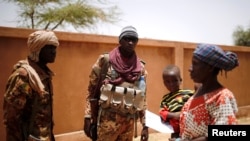U.N. agencies say humanitarian conditions for millions of people in Mali are deteriorating, as armed groups and extremists wreak havoc and destroy the livelihoods of civilians.
The United Nations reports around 4.3 million Malians need humanitarian aid this year, including more than one million who are suffering serious food shortages.
Uta Kollies, the head of the U.N. office for the Coordination of Humanitarian Affairs in Mali, calls their situation very disconcerting. She said people are unprotected. They live in a state of chronic insecurity and abuse, which paralyzes their ability to provide the most basic necessities for themselves and their families.
“People are unable to go to their fields because of the insecurity,” Kollies said. “Malnutrition is obviously coupled with the food insecurity and remains of high concern. We have a national prevalence of global acute malnutrition at about 9.4%, which is a serious situation according to WHO.”
Mali has experienced chronic instability since jihadist groups briefly seized control of the north in 2012. The groups and criminal networks remain active in Mali and neighboring countries despite the presence of French and African counter-terrorism forces.
Kollies said the international community spends far more money on beefing up military intervention in Mali than on helping people suffering from hunger, lack of food, water, health, education and other basic relief.
She said last year the U.N. received only half of its $324 million appeal. At the same time, she says the U.N. blue helmets, different national forces and the Malian army received a total of $3 billion.
Although these forces are in Mali to protect the population, she tells VOA they have done little to bolster security in the country.
“I personally think that asymmetric terrorist attacks in the past historically have very seldom been won with a military intervention only,” Kollies said. “You have to have political solutions and you have to follow up at that level.”
Kollies said she cannot recall any country where hundreds of thousands of soldiers being deployed has met with success in engaging in a war on terror.
What is needed, she said is a political solution and more financing for humanitarians who can help lift people up out of their despair.







